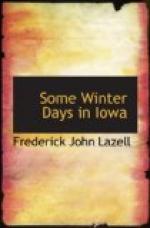The short winter day draws rapidly to a close and there is time for only a brief survey of the beauty of the upland trees. The fairy-like delicacy of the hop hornbeam, with its hop clusters and pointing catkins; the slender gracefulness of the chestnut oak; the Etruscan vase-like form of the white elm; the flaky bark and pungent, aromatic twigs of the black cherry; the massive, noble, silver-gray trunk of the white-oak; the lofty stateliness, filagree bark, and berry-like fruit of the hackberry; the black twigs of the black oaks, ashes, hickories and walnuts etched against the sky,—all these arrest your attention and retard your steps until the sun is near the horizon and you look over the tangled undergrowth of hazel, sumac, and briers, far through the trunks of the trees to the western sky which is bathed in flame color, as if from a forest fire.
You are alone and yet not alone. A rabbit scurries across your pathway. A faint little squeak voices the fright of a mouse. There is a swoop of wings which you neither distinctly hear nor clearly see, yet you are aware, in a less marked degree than was the mouse, that an owl was near. You feel certain that the downy woodpecker is asleep in that neat little round hole on the southwest side of a tree trunk, just a little higher than you can reach. In the early afternoon you saw a red squirrel go gaily up a tall red oak and climb into his nest of leaves. You fancy he is snugly coiled there now. This recent hill of fresh dirt—strange sight in January—was surely made by a mole, and you know that they are all somewhere beneath your feet: moles, pocket gophers, and the pretty striped gopher which used to sit up on his hind legs, fold his front paws, and look at you in the summer time, then give a low whistle and duck; meadow mice in their cozy tunnels through which the water will be pouring when the spring freshets come; the woodchuck in his long, long sleep, and the chipmunk with his winter store of food. And so watching, listening, and musing you come at length to the western edge of the woodland and look across the prairie, far as the eye can reach, to where the red ball of the sun hangs scarce a yard above the horizon. You look upon a scene which is peculiar to this part of Iowa alone. It is not found in any other state or nation on earth. “These are the gardens of the desert, for which the speech of England has no name—the Prairies.”
"Lo they
stretch
In airy undulations, far away,
As if the ocean, in his gentlest
swell
Stood still, with all his
rounded billows fixed,
And motionless, forever."




